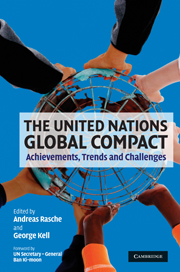Book contents
- Frontmatter
- Contents
- List of figures
- List of tables
- List of boxes
- List of abbreviations
- List of contributors
- Acknowledgements
- Foreword
- Why This Book Matters!
- The Ten Principles of the United Nations Global Compact
- 1 Introduction: the United Nations Global Compact – retrospect and prospect
- Part I Achievements, trends and challenges: reflections on the Principles
- Part II Participants and engagement mechanisms
- 7 Implementing the United Nations Global Compact
- 8 Academic institutions and the United Nations Global Compact: the Principles for Responsible Management Education
- 9 Corporate responsibility and the business school agenda
- 10 NGOs and the United Nations Global Compact: the link between civil society and corporations
- 11 Financial markets and the United Nations Global Compact: the Principles for Responsible Investment
- 12 Learning from the Roundtables on the Sustainable Enterprise Economy: the United Nations Global Compact and the next ten years
- 13 The United Nations Global Compact as a learning approach
- Part III Governance and Communication on Progress
- Part IV Local Networks: the emerging global–local link
- Glossary
- Bibliography
- Index
12 - Learning from the Roundtables on the Sustainable Enterprise Economy: the United Nations Global Compact and the next ten years
Published online by Cambridge University Press: 05 February 2012
- Frontmatter
- Contents
- List of figures
- List of tables
- List of boxes
- List of abbreviations
- List of contributors
- Acknowledgements
- Foreword
- Why This Book Matters!
- The Ten Principles of the United Nations Global Compact
- 1 Introduction: the United Nations Global Compact – retrospect and prospect
- Part I Achievements, trends and challenges: reflections on the Principles
- Part II Participants and engagement mechanisms
- 7 Implementing the United Nations Global Compact
- 8 Academic institutions and the United Nations Global Compact: the Principles for Responsible Management Education
- 9 Corporate responsibility and the business school agenda
- 10 NGOs and the United Nations Global Compact: the link between civil society and corporations
- 11 Financial markets and the United Nations Global Compact: the Principles for Responsible Investment
- 12 Learning from the Roundtables on the Sustainable Enterprise Economy: the United Nations Global Compact and the next ten years
- 13 The United Nations Global Compact as a learning approach
- Part III Governance and Communication on Progress
- Part IV Local Networks: the emerging global–local link
- Glossary
- Bibliography
- Index
Summary
Introduction
This chapter is about research that we have been conducting about the next ten years, starting from three premises. First, given the last ten years and the development of the United Nations Global Compact, what has been learned? Second, what would the world look like if the ten Principles of the Compact were implemented (and the Millennium Development Goals (MDGs) delivered)? And, third, how can we engage with a wide range of thinkers and actors around the world to see if there is commonality across cultures, industrial sectors, professions and intellectual disciplines? Our inquiry started in the House of Lords in London in January 2007, where we held six meetings of Roundtables on Sustainable Enterprise (RSE), and up to January 2009 also engaged with different participants through Roundtables in Cape Town, Toronto, New York, Sydney and Beijing as well as two international conferences at the Eden Project in Cornwall, UK, and at the Headquarters of Wessex Water in Bath, UK.
If we start with the idea that the Global Compact was designed to operate as a learning system, then we can see that it is fascinating to examine it as a model of how the world might be managed this century. The state we find ourselves in as a global community, rather than an international community, is that states, companies and nongovernment and non-business organizations all have legitimacy, all have a voice, all command attention, all demand to be recognized and all claim rights and responsibilities.
- Type
- Chapter
- Information
- The United Nations Global CompactAchievements, Trends and Challenges, pp. 215 - 233Publisher: Cambridge University PressPrint publication year: 2010



